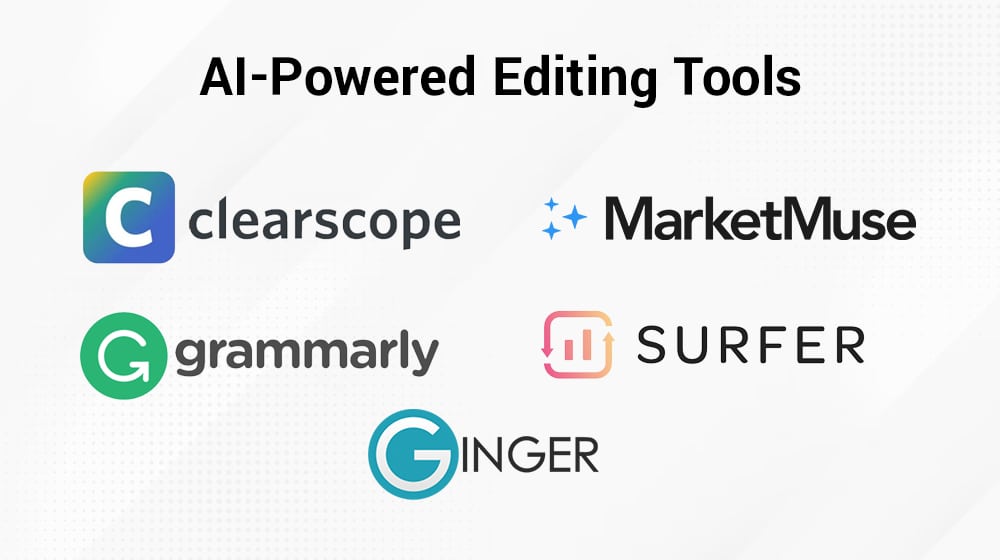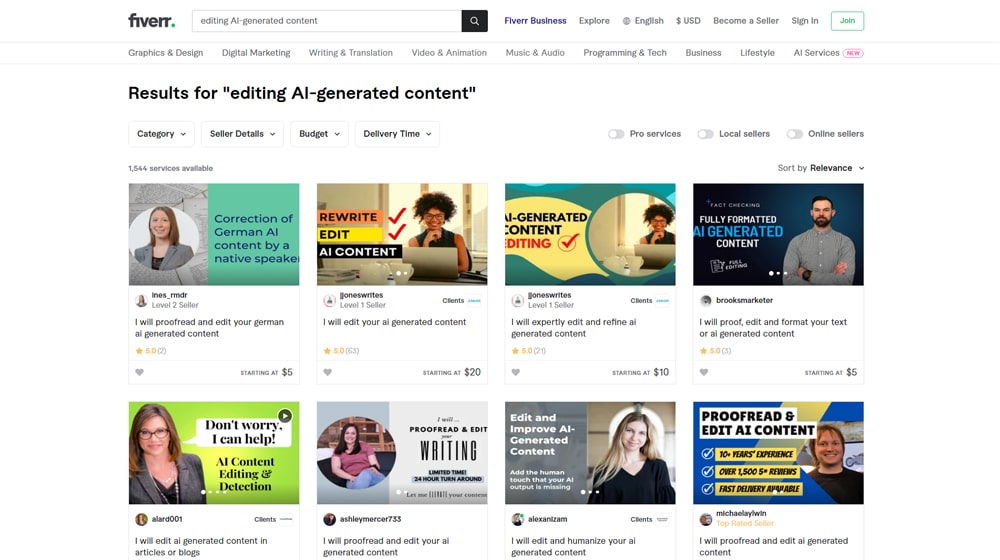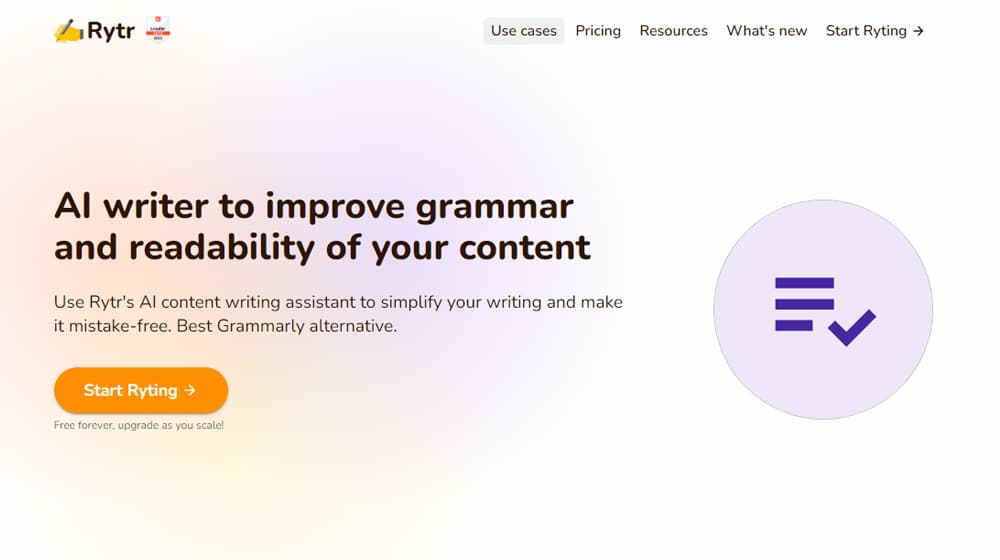As I've written about recently, AI is the next big trend in content production. While AI can streamline and speed up writing common and basic content, it still has a lot of issues. It can change tenses and POVs throughout a segment, it can produce segments that don't stitch together nicely, it can repeat content, and it needs fact-checking to produce verifiable content.
That's not quite what I'm here to talk about today, though. See, language AIs have been developed for a variety of different purposes, from real estate finances to stock predictions to SEO suggestions, so of course, it's coming into play in pretty much every industry you can think of. One such industry is adjacent to content production: editing.
Now, AI in editing is nothing new. In fact, you've been using a (very rudimentary) version of it for likely almost as long as you've been writing. Modern tools like Google Docs and Microsoft Office have spelling and grammar checks, and those checks are often backed by some level of machine learning. This isn't nearly as robust as a "full" AI (though even that is still a long, long way from what science fiction writers think of as real AI), but it's still the same concept.
You might not trust AI to write content for you, and that's fine. The system still needs more work before it can truly take over. Editing, though; can you hire an AI editing service? If so, how can you go about doing it?
 The truth is, you have several options here. Before I get into those, though, let's talk about editing and what an AI editing service can do for you.
The truth is, you have several options here. Before I get into those, though, let's talk about editing and what an AI editing service can do for you.The first thing you need to decide is what kind of editing you need. This is important any time you're looking for editing, but it's even more critical when AI is involved. Why? AI can perform some kinds of editing tasks but absolutely cannot perform others. So, depending on what you need out of an editor, you either need a hybrid option, or you can't use AI for your needs.

In my guide to hiring an editor, I run down the various kinds of editing. To recap, they are:
So, what kind of editing do you want, and can AI fill the role? Let's look at it from the top down.
 The real question, though, is whether or not you can hire an AI editing service to improve your content for you. The answer is yes, and there are three general options available to you.
The real question, though, is whether or not you can hire an AI editing service to improve your content for you. The answer is yes, and there are three general options available to you.AI-powered editing tools are services offered by companies to improve your content in some way, using AI to drive the suggestions they make. These come in two forms: generalized language AIs and more specific industry or purpose-aligned AIs.

Examples of these services include:
All of these are applications, plugins, or SaaS platforms that you can use to improve your content. You plug your content into them (or use a plugin for them in your favorite word processor) and go through their suggestions on how you can improve your content. This works as a kind of combination of a copyeditor and a line editor with industry or purpose-specific suggestions, generally in SEO.
The downside here is that you aren't really hiring a service in the way we think of services. You can't put your content into a service provider's interface and get improved, optimized content out the other end. Instead, you feed your content into it and get suggestions, which you then decide whether or not you want to take and implement.
Usually, these suggestions will be improvements to grammar or spelling, typo correction, added use of keywords (that you need to know in the first place), and ways to improve your content for readability scores and other metrics.
You still need to do the work to improve the content, and you need to be familiar enough with the process of editing to know when to take a suggestion and when to ignore one. But these tools can take the place of an editor, or you can hire an editor who uses those tools.
This isn't quite what most of you are probably thinking of when you think "AI editor," though, so are there any real – or "real" – AI editor services out there?
This option is more obfuscated. The reason is because AI editing is a relatively new field, so most editing services aren't going all-in on it just yet. Many, if not most of them, are already using AI-driven tools to help power their editing suggestions, like Grammarly-style suggestions. But most of them won't advertise that they're using AI editing tools.
There's a good reason for this: currently, AI doesn't have a lot of trust in the realms of editing. AI can generate good-looking content, and a different AI can offer suggestions on improving it, but it still takes human judgment and oversight for things like deeper content suggestions, true understanding of the topic and the nuances of it, and aligning content with what readers actually want to read.
The truth is, pretty much any editing service currently available, from individual professional editors to large-scale editing services, is going to be using some form of AI-driven tool to assist them. This can range anywhere from low-level copyediting suggestions to more robust use of AI.

Some are more forthright about it, of course. Fiverr is a good example; there are plenty of people offering AI editing services, some of which are editing AI-generated content, and some of which are using AI to edit content. The distinction can be difficult to sort out, but it's important.
The issue here is that you won't generally be able to know or control what use of AI a service is doing. They offer an editing service, and you can take it or leave it.
The third option is to use one of the currently-available AI writing tools but focus on the editing services they provide. One example on the forefront of this ability is Rytr. Rytr is an AI platform similar to something like Jasper, with a ton of different micro-formats for using the AI to generate content for you in various styles and forms. But, when you scroll through their various services, you see something like this: use the AI to improve your content.

This is truly an AI-driven option for editing your content. It still requires you to have someone there to push the button and to decide if the content is satisfactory when the AI outputs it, but that's still a lot faster than hiring a high-level editor to go through your content line by line.
Jasper has integrations with Surfer SEO and Grammarly to provide editing options for the content it produces, and other AI writing platforms have various forms of "content improvement" that work more or less the same way. The secret, of course, is that all of these AI systems are basically the exact same thing with a different skin over it.
Which option is the best option for you?
Truthfully, while AI can make some content suggestions and can improve or streamline some kinds of content, it's not perfect, and you still need a human to oversee them. So, here's my suggestion.
First, hire an editor. A real, human editor who knows what they're doing. I have a whole set of resources on how you can do this, and my job board is a good place to go to post a job opening looking for those editors.

Once you've found a good editor, you can arm them with AI-powered tools to help them do their job faster and more efficiently. I don't know that I would recommend something like Jasper or Rytr right now – their purpose is too much on the writing end and not enough on the editing end to be worth the money solely for editing – but tools like Surfer, Clearscope, MarketMuse, or even Ginger can all be worthwhile additions.
AI has not yet reached the point where it can fully replace people in your content production. After all, they're still all just tools; you need someone to operate the tool. All it does is change the skills necessary to succeed in the industry.
Good editors – truly excellent editors – will blow any editing AI out of the water. What AI does is speed up the basic copyediting and line editing an editor would need to do, leaving them with more time, energy, and attention to spend on the developmental editing side of the coin.
If that's what you're looking for, give my job board a try. Or, if you have questions about any aspect of this process, feel free to leave a comment or drop me a line directly. I'd love to chat and help you out! If you're looking for any further information regarding using AI for content production, be sure to check out this page over here, where you can find information about AI content writers, AI copywriters, and more.